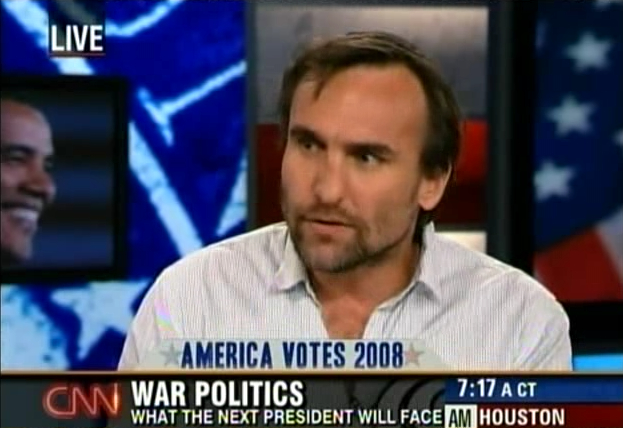AAM: "Even in a war, politics is very much a part of it."

Length: 4:18
LARGE (49.9 MB) ----- SMALL (5.2 MB)
Michael speaks with Kiran Chetry again, about the politics of war -- in Iraq and in Georgia. And Iran is a factor in both.
(BEGIN VIDEO CLIP)
SEN. HILLARY CLINTON (D), FORMER PRESIDENTIAL CANDIDATE: And we know that President Obama will end the war in Iraq responsibly, bring our troops home, and begin to repair our alliances around the world.
(END VIDEO CLIP)
KIRAN CHETRY: That's Hillary Clinton on stage last night. There's a new CNN Opinion Research Poll, though, that suggests Americans actually think John McCain is the better man for the job in Iraq. 53 percent of voters saying McCain would better handle the situation in Iraq compared to 44 percent for Obama.
So, whether it's Barack Obama or John McCain in the White House come January, the war in Iraq and another potential Cold War with Russia will be at the top of America's foreign policy agenda. And CNN's Michael Ware spent a lot of time in Iraq. He joins us here in studio.
It is interesting when you look at those polls because the majority of Americans do think, you know, it's time to get out. Yet, when you ask who's going to handle it better, it's John McCain. What are you hearing from some of the military leaders behind closed doors about, you know, what their dream plan would be?
MICHAEL WARE, CNN INTERNATIONAL CORRESPONDENT: Well, obviously, senior American commanders play their cards close to their chest when it comes to politics because they know they do not operate in a vacuum. Even in a war, politics is very much a part of it. Now, what I can tell you is that from a military man's point of view, it's more of a McCain tendency in the sense of "we stay, we consolidate, and we let conditions on the ground tell us when we go, when we add on, when we subtract."
However, I can tell you that the military itself, though, is much more broad-minded on issues like engagement with some of the countries in the region or other groups. For example, it's the military who started talking to the Ba'athist insurgency. It's the military who's got the Ba'athist insurgency now on the payroll -- 110,000 plus insurgents on the U.S. government payroll. So, it's a little bit of both.
CHETRY: Which is a big reason for the sectarian violence drop.
WARE: Absolutely. And it's also done a whole number of things, doing that. Basically, it's an American militia to counter the Iranian militias and also keeps your very troubled Arab allies much happier because they now feel that they have a stake in Iraq.
CHETRY: So what happens when we leave? Do those Ba'athists still continue to be able to be that countermeasure?
WARE: That is a huge question. Now, you get lip service from the government in Baghdad about maintaining the program, developing it, this, that and the other. But from day one, the Shia-dominated Iranian-backed central government hated this program, came out and openly attacked it. Now, American commanders say that, well, they've matured in their attitude, they're more embracing.
What do we see just a few days ago? The government hunting down some of these U.S.-paid security people who were former insurgents and arresting or killing them. I mean, these guys are not hiding their true intention in the government. They're gonna come for these blokes.
CHETRY: That, of course, as we know, is a huge challenge that either of these two men will inherit as president. Another one, though, is the Russia situation. And what we saw between Russian and Georgia and some of the comments by Russia's president about a Cold War.
Are we facing the real distinct possibility of entering into another Cold War with this very powerful and it seems a little bit aggressive country?
WARE: Yes. Well, I think -- you know, it's very easy for people to bandy around the rhetoric at the moment, from Moscow to Washington to Tbilisi. And, Cold War in the sense that we all grew up knowing it? I suspect not. But a new kind of international dynamic with an opposing force from Russia, expansive, aggressive, wanting to send -- absolutely.
And we're going to see it across all sorts of fronts. For example, what happened in Georgia is not unrelated to the fact that Russia is helping Iran with its nuclear program. And that America needs Russia's help in the Security Council for sanctions or other measures against Tehran. And the Russians know that. So, they knew that when they went into Georgia there was only so much America could do because: Georgia, here, but they know that America needs Russia over here.
CHETRY: Very interesting there. A delicate diplomatic dance as well on that front. A lot of problems.
WARE: Oh, yeah.
CHETRY: That's why we're glad we have you with the insight. Thanks, Michael Ware. Good to see you as always.
WARE: Great pleasure.
